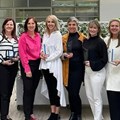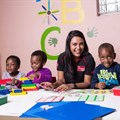MySchool MyVillage MyPlanet (MySchool) celebrates its 25th anniversary this year. The Woolworths-led loyalty and corporate social responsibility programme has provided support of almost R1bn to more than 8,000 schools and NGO beneficiaries across the country since its inception.

Several management representatives from Woolworths including CEO Roy Bagattini and general manager of MySchool Pieter Twine attended the 25-year anniversary celebration, along with other representatives from the public and NGO sectors. The event took place at Christel House School in Cape Town.
Established by two Johannesburg-based parents in 1997 as a means to help schools sustainably raise funds, Woolworths became the programme's anchor partner two years later. While it initially focused only on schools, its success with customers saw it expand to include charitable organisations with MyVillage and MyPlanet being launched in 2006 and 2008, respectively.
The MySchool component focuses on the pre-school to tertiary phases, MyVillage assists charitable organisations that support people and communities, and the MyPlanet component benefits environmental and animal organisations - both domestic and wild.
The programme thrives on a simple mechanism - every time a customer swipes their MySchool card at a participating retailer - including Woolworths, Engen, and Loot.co.za - the retail partner donates a percentage of that customer’s spend to their chosen cause.
Time, passion and commitment
As general manager, Pieter Twine has headed up the programme for over two decades. He has seen the organisation transition from a small entrepreneurial business to becoming part of the Woolworths Group of companies, winning numerous awards along the way.
"Growing and integrating a startup business into a corporate business is not an easy journey. It takes time and passion from both the corporate and the founders," said Twine.
"Further managing expectations in a multi-partner programme always comes with interesting challenges to ensure that all business partners remain committed and engaged. Cost, cash flow management and investing in systems during the early years of the programme were amongst the more difficult things that needed to be done, however, once these were in place, we could focus on building a very unique and differentiated brand that truly makes an ongoing difference."
Critical support from Woolies
Highlighting some of the important elements contributing to the programme's success, Twine said the buy-in from Woolworths in the early 2000s was critical: "Without their support (both financial and people), the MySchool brand would not have been able to achieve the success and impact that it has made to date in the country. Trust in the MySchool brand is strongly aligned with the Woolworths brand - although it's many years younger than the 90-year-old Woolworths brand."
The MySchool programme has also established various funds to serve specific sectors of need with initiatives that are geared toward long-term sustainability. These include:
- The Thuso Fund which contributes to high-impact projects that support up to eight of the UN Sustainable Development Goals, collaborating with credible NGOs and business partners.
- The Dream2Teach Scholarship Fund which subsidises scholarships for students wanting to become teachers.
- MySchool partners with Woolworths on the Woolies Water Fund, donating R5.5m to date, installing over 152 water tanks and over 550 hand washing stations in schools and areas of need.
- The MyPlanet Rhino Fund supports rhino protection and rehabilitation as well as ranger training and high-tech security assistance supporting anti-poaching initiatives.
Making a sustainable difference
"We would like to inspire many more people in South Africa to join us on the journey and live out our purpose of making a difference.
"In doing this, we continue to focus on improving education outcomes, especially within early learning and literacy; developing work-ready youth and unlocking access to the economy, employability and income-generating activities; improving access to food and clean water to support food security; and protecting, restoring and promoting sustainable ecosystems for long-term resilience," said Twine.










































